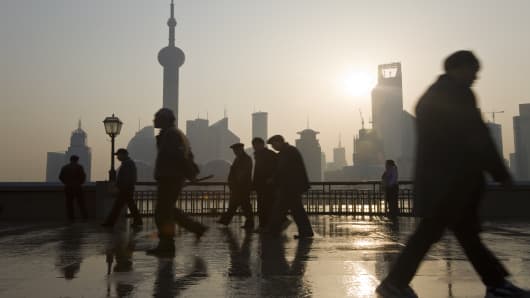The downturn in the world's second largest economy, China, could be the most drawn-out since the 1997-1998 Asian Financial Crisis, said research firm IHS, following a slew of weaker-than-expected economic data for May released over the weekend.
"The macro data for May have confirmed that the economy is stuck in stagnant growth again after a brief rebound. The risk for growth is now predominantly on the down side," Xianfang Ren, senior economist at IHS, wrote, highlighting that persistent deflation in producer prices and the pullback in fixed asset investment growth are two grave concerns.
"Deflation [producer prices] has lasted for 15 straight months, compared with 12 months during the Global Financial Crisis [in 2008-2009]. That offers a signal that this round of downturn might turn out to be the most drawn-out one since the Asian Financial Crisis which had thrown China into 31 straight months of deflation," she said.
(Read More: China Data Highlights Weak Economy, Remedies in Focus)
China's producer price index fell 2.9 percent in May from a year earlier, steeper than a 2.6 percent decline in April.
Industrial deflation is "poisonous," Ren added, as it impacts business profitability and thus deters investment in inventory or equipment.
The cornerstone of China's economic recovery, fixed asset investment, also saw growth weakening to 20.4 percent year on year in the January-May period from 20.6 percent in the January to April period – driven by a slowdown in the manufacturing sector.
Investment growth in newly started projects, a leading indicator of investment, fell to 15.4 percent year on year in May from 17.9 percent in April. "[This is] quite a weak growth considering that China's investment in the first half of 2012 had been quite soft and thus the base effect for this year shall be quite favorable," Ren said.
This is a reflection of tighter funding conditions, she said, which are a result of a crackdown on shadow banking and on local government financing vehicles plus cooling measures in the property market.
"The upside with investment is quite limited, as we are not seeing any signs yet that these restraints will be lifted," Ren said.
(Read More: Former US Treasury Secretary Urges Change in China)
The real estate sector - an important driver of fixed asset investment - showed weakness in May, with growth of new home starts, property transactions and land purchases falling.
According to Zhiwei Zhang, chief China economist at Nomura, softness in the housing space suggests overall investment growth will trend down in the coming months.
"We were struck how the leading indicators slowed across the board, highlighting downside risks to our below-consensus growth outlook," Zhang added. He forecasts gross domestic product (GDP) growth of 7.5 percent in the second quarter.
Another Week, Another Downgrade
The latest round of disappointing economic data prompted banks including RBS and Barclays to cut their growth forecasts for the mainland economy over the weekend.
RBS lowered its GDP growth forecast to 7.5 percent from 7.8 percent, while Barclays slashed its outlook to 7.4 percent from 7.9 percent. The latter's forecast is below the government's 7.5 percent annual target.
(Read More: China Likely to Tolerate 7% Growth Before Hitting Stimulus Button)
Jian Chang, economist at Barclays, said the bank's target reflected the new leadership's "tolerance for slower growth."
"We now think Premier Li's [Keqiang] bottom line for growth is probably lowered to 7 percent from 7.5 percent. His recent speeches highlighted the challenges for China to reach the 7 percent target in this decade and the need to accelerate structural reforms to unleash growth potential," she said.
Chang believes Beijing will lower its growth target for 2014 to 7 percent, but actual growth will be stagnant around 7.4 percent closer to this year's target.
"Fundamentally, China is going through a transition period, and pain is unavoidable, as the economy experiences a deflating of the global demand and domestic investment bubble, while searching for new growth drivers and impetus through upgrading, innovation, and more balanced growth," Chang added.
(Read More: Stop Fixating on Data, China Doing Fine, Says Roach)
By CNBC's Ansuya Harjani



